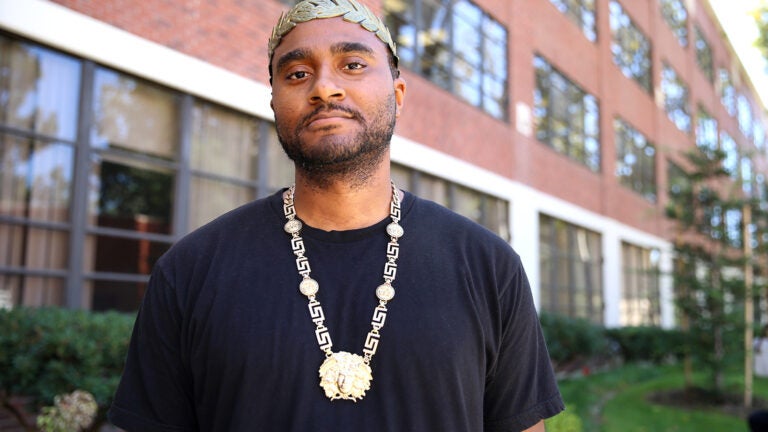
Classics instructor is keepin’ it real with Homer
Brandon Bourgeois is the Trojan horse of Greek poetry. Or maybe the Jay-Z.
Clad in black, a gold medallion depicting the face of Medusa slung around his neck, Bourgeois takes to the stage at the front of a room of classics students on a recent afternoon.
And starts to rap.
3,000 years ago, a Greek poet whose name was Homer composed a flow for his feta, he was a real rov-uh.
He spun and spread a tale of lust, war, rage and revenge.
A tapestry, a masterpiece, words stitched together without a pen.
A story — rather gory in detail:
10 years of bloody battle waged by Greeks over a female — hell, you heard-uh Helen.
She sailed to Asia with a prince named Paris already married to a Spartan king named Menelaus.
Ran to his brother — the great king Agamemnon: “What happened to my queen?!” The brotha told him to stay strong: “We out for blood!
“Grab your weapons, spread the message to all the kings in Greece. We’ll have your Helen home in no time, a matter of weeks.”
The lyrics are a hip-hop introduction to his adaptation of the prologue to The Iliad — delivered as a rap lecture in staccato bursts to music Bourgeois composed using Apple’s GarageBand app. Street-wising The Iliad is, of course, his way to make the classic poem — one of the foundational texts of Western civilization — relevant to a modern audience. But it’s more than that.
The ancient world’s Jay-Z?
For centuries, The Iliad passed from generation to generation by spoken word. Homer lived in the eighth century B.C. and told a story that dated from the 12th century B.C., Bourgeois said. It wasn’t until around the sixth century B.C. that the sprawling epic was committed to the page.
Bourgeois believes that the oral tradition that kept The Iliad alive bears remarkable similarities to modern rap. Both tell tales of everyday life, hardship, violence, love lost and gained. Both are histories.
“Homer is at the end of a long line of bards just like him,” Bourgeois noted. “And he happens to be the best at it. He happens to do things with the stories that no one else has done before. It’s like having Jay-Z. Jay-Z’s not the first rapper ever, but he’s in the tradition.”
Bourgeois arrived this summer at the USC Dornsife College of Letters, Arts and Science as freshly minted assistant professor of classics. His primary area of research focuses on Roman political tradition.
Bourgeois acknowledges that the classics have long been considered the domain of white scholars. The glory of Greece and Rome have even been invoked by white supremacists to allege their superiority.
But the scholar notes that the classics have also been used as a tool for emancipation.
Fredrick Douglas was inspired and informed by a primer on classical oratory that he spirited from the room of his owner’s son. Enslaved Africans across America in the 18th century absorbed the classics to promote insurgency.
And it didn’t end there.
“Huey Newton (co-founder of the Black Panther Party) taught himself how to read, self reportedly, by reading Plato’s The Republic,” Bourgeois said. “… (Newton’s) entire autobiography in which this is mentioned, called Revolutionary Suicide, is actually modeled on Plato’s Allegory of the Cave.”
‘Hype 4 Homer’
It’s hard to imagine that Bourgeois would end up as a classics professor, much less an accomplished rapper, based on his early academic aspirations. The son of a nurse and a pharmaceutical executive, Bourgeois headed to the University of Chicago as an economics major.
“I wanted to be filthy rich. I wanted to be one of those guys that you would see in a limo or something, and people would shout down the street, ‘Die, you capitalist pig.’ I wanted to be that rich.”
There was only one problem: He hated economics.
His path began to change thanks to an influential friend in his fraternity who spoke 16 languages and dabbled in classics, which led Bourgeois to courses in the same and, ultimately, a Ph.D. from Ohio State University.
Bourgeois’ ability to translate The Iliad into rap lyrics comes from more than his knowledge of ancient tomes. He was an avid actor and president of the theatre club in high school, and a card-carrying member of the Junior Thespian Society, he says. He also plays guitar and plinks the piano when he visits his parents.
Those diverse talents and interests have coalesced into his performance project, which he calls Hype 4 Homer. His ultimate goal is to render the entire Iliad in rap — what he calls The Trilliad. “Trill” is a hip-hop portmanteau for “true and real.”
“The project is not just a marriage between hip hop and ancient Greek poetry,” he said, “but a marriage between Homer and I.”
Watch Professor Brandon Bourgeois perform “The Trilliad,” a rap-presentation of The Iliad.